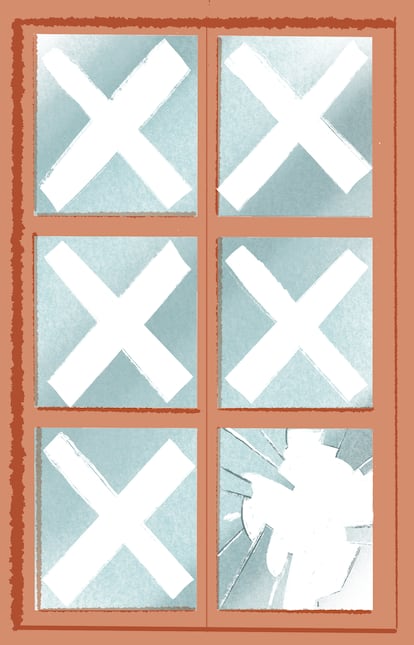Thirty years of talking about Pablo Escobar
His most lasting legacy was to inject the virus of corruption into a more or less stable democracy, and even to forever disrupt the value system of Colombian society

In a few weeks it will be 30 years since Pablo Escobar, the most infamous drug trafficker in history, was shot dead on the rooftops of Medellín. He had escaped 16 months earlier from La Catedral, the prison Escobar built himself to his specifications in return for agreeing to submit to justice, and it was not the only irony when he had spent the last few years trying to subdue the country. During 16 months on the run, living in hiding and harassed by government forces, the DEA, and rival cartels, Escobar unleashed on my country’s civil society a campaign of desperate terrorism that marked our lives, the lives of my generation, as nothing else has.
A character in a novel of mine recalls a phrase attributed to Napoleon Bonaparte: “To understand a man, you have to understand the world that existed when he was 20 years old.” I think of my entire generation: the world of our 20s was the world of 1993, the world of bombs in shopping malls, of citizens turned into random and gratuitous military targets, and of windowpanes crossed with white ribbons, lest they become murderous shards when an explosion sent them through the air. It was the world of living in fear, the world in which we all knew a victim of narco-terrorist violence, or the family of a victim. The world in which the victim was in our families: yes, it was that world too. For those were the days when no one was safe. And that has always helped me to know my generation.
Escobar’s death marked the end of a decade of violence in Colombia that was unlike anything we had lived through before, or anything we have lived through since. Escobar led a terrorist organization that left some 5,000 people dead and many more families destroyed, and he took his war to civil society in unprecedented ways. I have engraved in my memory his dialogue with a lieutenant during a wiretapped call, at a time when he was, or felt he was, cornered. “We have to create a messy chaos so that they ask for peace,” he said. “If we dedicate ourselves to hitting politicians, burning their houses and creating a civil war, then they will have to call us to a peace dialogue and our problems will be solved.” In another call, Escobar said: “We have to give it to the politicians, to the military that are trampling on us, to the judges who are trampling on us, to the journalists.” Yes, I have known several journalists who preserved their lives — most of them by fleeing the country — and I know the orphaned children of those who did not make it. And the widows or widowers of politicians or judges who were killed by the Medellín Cartel: I know them.
During his time in the Colombian public arena, Escobar set up a drug-trafficking mafia that made him one of the richest men in the world (and I’m not sure why, but nobody remembers this point without adding: “according to Forbes magazine”), but which also injected into a more or less stable democracy the virus of corruption, and even forever disrupted the value system of the whole of society. Today, from the perspective of 30 years later, it seems clear to me that this is his most lasting legacy, even if it is not the most painful for everyone. The flow of drug money into Colombian society disrupted its politics, of course, but also the rest of civil life. It disrupted the Church: Rafael García Herreros, an influential priest, said Escobar was “a good man I want to take to heaven,” and accepted expensive donations for his charity projects. He even disrupted soccer: everyone remembers the other Escobar, Andrés, killed by gamblers after the Colombian national team was eliminated from the 1994 World Cup.
In a few lines of News of a Kidnapping that I have quoted more than once, Gabriel García Márquez makes a worried diagnosis in which there is no naivety. There he wrote: “A drug more harmful than the so-called heroic drugs has entered the national culture: easy money. The idea flourished that the law is the greatest obstacle to happiness, that learning to read and write is useless, that one lives better and safer as a criminal than as good people. In short: the state of social perversion typical of every latent war.” I believe he saw it with lucidity. Mine has always been a society of easy violence, and it is enough to hear the stories of grandparents for proof of this, but Escobar’s passing left Colombia a different place. Escobar did not invent the sicarios — those young men with no future who kill for little reward — but he did contribute generously to lowering the defenses of an entire society against the phenomenon. I say it correctly: lowering the defenses. That is what happens, I believe, when a society is impregnated by certain phenomena of violence, corruption, or inversion of values: the social (or political) body becomes less able to reject them, or, what is almost always the same, more willing to tolerate them.
The conclusion has not changed: in these 30 years, Escobar has ceased to be just a drug trafficker and murderer and has become a media personality. He has long enjoyed a certain vulgar celebrity, and an unbeatable cocktail of stupidity, crass ignorance and moral blindness has turned him into a brand. There he is, at the pilgrimages organized in Medellín for dumb tourists. There he is, with his convict mugshot from the 1970s, on the t-shirts that are sold everywhere. I have to accept the disgust that this produces in me: not that someone earns a few dollars from the face of a terrorist, but that a brainless person hands over those dollars and then wears the t-shirt in public without visible shame. And one cannot plead ignorance or unawareness, because the reason why that face is on that t-shirt is the ubiquity of television series that tell the story of that life. Some — like the Colombian show El patrón del mal (Pablo Escobar, The Drug Lord) — are genuine attempts to understand a historical moment, and also explore it with historical rigor and artistic talent; others are of a lightness that borders on insult, and in each frame, it is evident that the makers do not even realize it.
All this has occurred to me now — when there are only a few weeks left before Escobar’s name appears again in the media — because we can already imagine the number of articles or broadcasts, acts of curiosity or even frivolity, that will bring him to our memory again. This, of course, is one of those articles, and I apologize. But I write it with the aim of wondering out loud how long it will take for the image of a murderer to cease to be offensive, or for us to be laundering it, neutralizing it, turning it into something more tolerable within our insufferable culture of the banality of violence, constant entertainment, and socially accepted insensitivity, all of which constitute our preferred way of exploring the world.
Sign up for our weekly newsletter to get more English-language news coverage from EL PAÍS USA Edition
Tu suscripción se está usando en otro dispositivo
¿Quieres añadir otro usuario a tu suscripción?
Si continúas leyendo en este dispositivo, no se podrá leer en el otro.
FlechaTu suscripción se está usando en otro dispositivo y solo puedes acceder a EL PAÍS desde un dispositivo a la vez.
Si quieres compartir tu cuenta, cambia tu suscripción a la modalidad Premium, así podrás añadir otro usuario. Cada uno accederá con su propia cuenta de email, lo que os permitirá personalizar vuestra experiencia en EL PAÍS.
¿Tienes una suscripción de empresa? Accede aquí para contratar más cuentas.
En el caso de no saber quién está usando tu cuenta, te recomendamos cambiar tu contraseña aquí.
Si decides continuar compartiendo tu cuenta, este mensaje se mostrará en tu dispositivo y en el de la otra persona que está usando tu cuenta de forma indefinida, afectando a tu experiencia de lectura. Puedes consultar aquí los términos y condiciones de la suscripción digital.









































